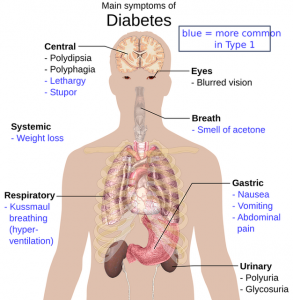Type 2 Diabetes. Some news reports have suggested that high selenium intakes and status may be potential risk factors for the development of type 2 Diabetes mellitus. However, current data show that supplemental selenium does not cause diabetes [Schomburg 2020].

Moreover, in the Selenium Trial, the researchers saw no causal role for selenium in the development of insulin resistance or diabetes. Instead, they observed decreased fasting blood glucose levels in the selenium supplemented group compared to the control group [Jacobs 2019].
Best Explanation for UNCLEAR Selenium and Diabetes Link
Professor Lutz Schomburg, Charité Hospital, Berlin, has explained that it is likely that high serum selenium levels do not cause type 2 diabetes but, rather, that type 2 diabetes causes high serum selenium concentrations [Schomburg 2020].
How does this work?
- Under normal conditions, the availability of insulin decreases selenoprotein P biosynthesis and secretion in the liver.
- In conditions of insulin resistance, this inhibition of selenoprotein P biosynthesis declines.
- Consequently, selenoprotein P levels increase as do selenium concentrations in the blood circulation.
- Thus, high serum selenium does not increase diabetes risk. Diabetes causes increasing selenoprotein P and circulating selenium levels.
- Then, in the later stages of type 2 diabetes with decreasing insulin levels caused by the decline in beta-cell function, the high glucose concentrations continue to promote selenoprotein P biosynthesis and secretion unless the selenoprotein P biosynthesis is counteracted by medication, e.g., metformin.
Clinical Studies of Selenium and Diabetes
Prof. Schomburg notes that the type 2 diabetes disease is quite complex. At least five different subgroups of type 2 diabetes patients can be distinguished.
That means that serious clinical studies comparing diabetic patients with non-diabetic controls need to have at least 100 subjects per diabetes sub-group included if the outcomes are to be reliable [Schomburg 2020].
As we do not have such highly powered clinical trials, the relationship between high dietary selenium intakes and blood selenium concentrations and the risk of type 2 diabetes remains unclear and controversial [Alharithy & Alafif 2023].
Conclusion: Selenium and Diabetes
A 2018 systematic review and meta-analysis of relevant studies has shown that the results for the relationship between selenium and type 2 diabetes differ between observational studies and randomized clinical trials. Observational studies seem to show a correlation between blood selenium levels and the risk of type 2 diabetes. The randomized controlled trial results do not show any significant relationship between the two variables [Kohler 2018].
It could be that these differences are the result of uncontrolled confounding variables in the observational studies [Kohler 2018].
It could be that the relationship between diabetes and blood selenium concentrations can be explained by the effect of diabetes on the liver biosynthesis of selenoprotein P [Schomburg 2020].
Sources
Alharithy M & Alafif N. Association of selenium intake and selenium concentrations with risk of type 2 diabetes in adults: a narrative review. Metabolites. 2023;13:767.
Jacobs ET, Lance P, Mandarino LJ, Ellis NA, Chow HS, Foote J, Martinez JA, Hsu CP et al. Selenium supplementation and insulin resistance in a randomized, clinical trial. BMJ Open Diabetes Res Care. 2019:7:e000613.
Kohler LN, Foote J, Kelley CP, Florea A, Shelly C, Chow HS, Hsu P, Batai K, Ellis N, Saboda K, Lance P, Jacobs ET. Selenium and Type 2 Diabetes: Systematic Review. Nutrients. 2018 Dec 5;10(12):1924.
Lippman SM, Klein EA, Goodman PJ, Lucia MS, Thompson IM, Ford LG, Parnes HL, Minasian LM. Effect of selenium and vitamin E on risk of prostate cancer and other cancers: the Selenium and Vitamin E Cancer Prevention Trial (SELECT). JAMA. 2009;301:39–51.
Schomburg L. The other view: the trace element selenium as a micronutrient in thyroid disease, diabetes, and beyond. Hormones (Athens). 2020 Mar;19(1):15-24.
Thompson PA, Ashbeck EL, Roe DJ, Fales L, Buckmeier J, Wang F, Bhattacharyya A, Hsu CH. Selenium supplementation for prevention of colorectal adenomas and risk of associated type 2 diabetes. J Natl Cancer Inst. 2016;108(12):djw152.
The information presented in this review article is not intended as medical advice and should not be used as such.
15 July 2023
